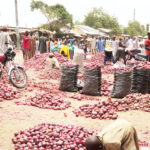Nigeria’s inflation figure reached a climax of 24-year, increasing to a posting of 28.92 per cent rise in December, 2023, a report by the National Bureau of Statistics (NBS) has shown.
The report, released Monday, indicated that the increase had been on the back of a 12-month sustained increase in prices of goods and commodities.
It stated that prices of rent, pharmaceutical products, air transportation, medical services, bread, potatoes were among others that influenced the rise.
The report said that in December, the inflation rate increased to 28.92 per cent relative to the November, 2023, headline inflation rate which was 28.20 per cent; a 0.72 points increase.
- Amnesty Int’l to Tinubu: Treat epidemic of kidnapping as emergency
- 5 bodies recovered, scores missing as boat carrying 100 capsizes in Niger
On a year-on-year basis, the headline inflation rate increased by 7.58 per cent compared to the rate recorded in December, 2022, which was 21.34 per cent.
Food inflation records 33.93 per cent
The report went on to show that the food inflation rate increased to 33.93 per cent on a year-on-year basis, which was 10.18 per cent points higher compared to the rate recorded in December, 2022 (23.75 per cent).
It said the rise in food inflation on a year-on-year basis was caused by increases in prices of bread and cereals, oil and fat, potatoes, yam and other tubers, fish, meat, fruit, milk, cheese and egg.
The report reads in part: “On a month-on-month basis, the food inflation rate in December, 2023, was 2.72 per cent. This was 0.30 per cent higher compared to the rate recorded in November, 2023 (2.42 per cent).
The highest increases in the products were recorded in prices of passenger transport by road, medical services, actual and imputed rentals for housing, passenger transport by air, pharmaceutical products and accommodation services.
Inflation highest in Kogi
On state profile, Kogi State recorded the highest inflation of 35.58 per cent, followed by Lagos (32.33 per cent) and Rivers (32.16 per cent).
Conversely, Borno had the lowest of 23.27 per cent, followed by Taraba (24.92 per cent) and Katsina (26.52 per cent).
For food inflation, the highest prices were in Kogi (44.73 per cent), Kwara (41.33 per cent) and Imo (39.54 per cent), while Bauchi (27.49 per cent), Jigawa (27.98 per cent) and Sokoto (28.72 per cent) recorded the slowest rise.
Why Nigeria yet to tame inflation
A senior economist at the SPM Professionals, Paul Alaje, said Nigeria’s headline inflation continued to rise due to the government looking for a quick fix rather than paying attention to the actual problem.
Alaje identified three issues fueling the inflation figure which he said had gone beyond what the Central Bank of Nigeria (CBN) could handle.
He said food inflation was on the top of the list due to farmlands becoming insecure, lack of structured farming systems that would lead to farm plantations and energy cost to transport food to different parts of the country.
He explained that, “Our farms are becoming more insecure, if the suburb of Abuja is facing insecurity, what will happen in places where foods are produced. We have poor organisation of farm settlement, how many organised farms do we have in Nigeria. There is no future for stable food supply if we do not go beyond the peasant farming system into much structured farming pattern.
“Another reason is logistics, as the price of diesel has increased. The state of our roads is bad, the price of diesel has increased to the point that if farmers do not increase their prices, transportation costs will have a tremendous effect on it.”
He added that the demise of local manufacturing production was another factor, saying the sector had been faced with high energy costs while contending with the devaluation of naira that had forced them to buy raw materials at higher prices.
He further said this was making the country not be able to compete favourably in the international market as the economy was also dependent on importation of goods and services.
He explained further that, “The inflation has gone beyond what the CBN has solved. This is because we have lost control of what exchange should be, it has reduced to convergence or stability. MPR is the major tool to control inflation, if the CBN should attempt to increase it, banks will write their debtors on what they will. That will create an effect on employment and will lead to more poverty, hunger and deprivation.”
Chief Economist, Coronation Merchant Bank Economic Research, Chinwe Egwim said:”
In recent years the transmission effect of MPR hikes has been weak in relation to combating rising inflation. Looking ahead, we anticipate a firmer handshake with the fiscal authorities, emphasizing a nuanced approach to address inflationary pressures. The CBN’s halt in usage of quasi-fiscal tools signals a commitment to a more cohesive policy stance.”

 Join Daily Trust WhatsApp Community For Quick Access To News and Happenings Around You.
Join Daily Trust WhatsApp Community For Quick Access To News and Happenings Around You.

